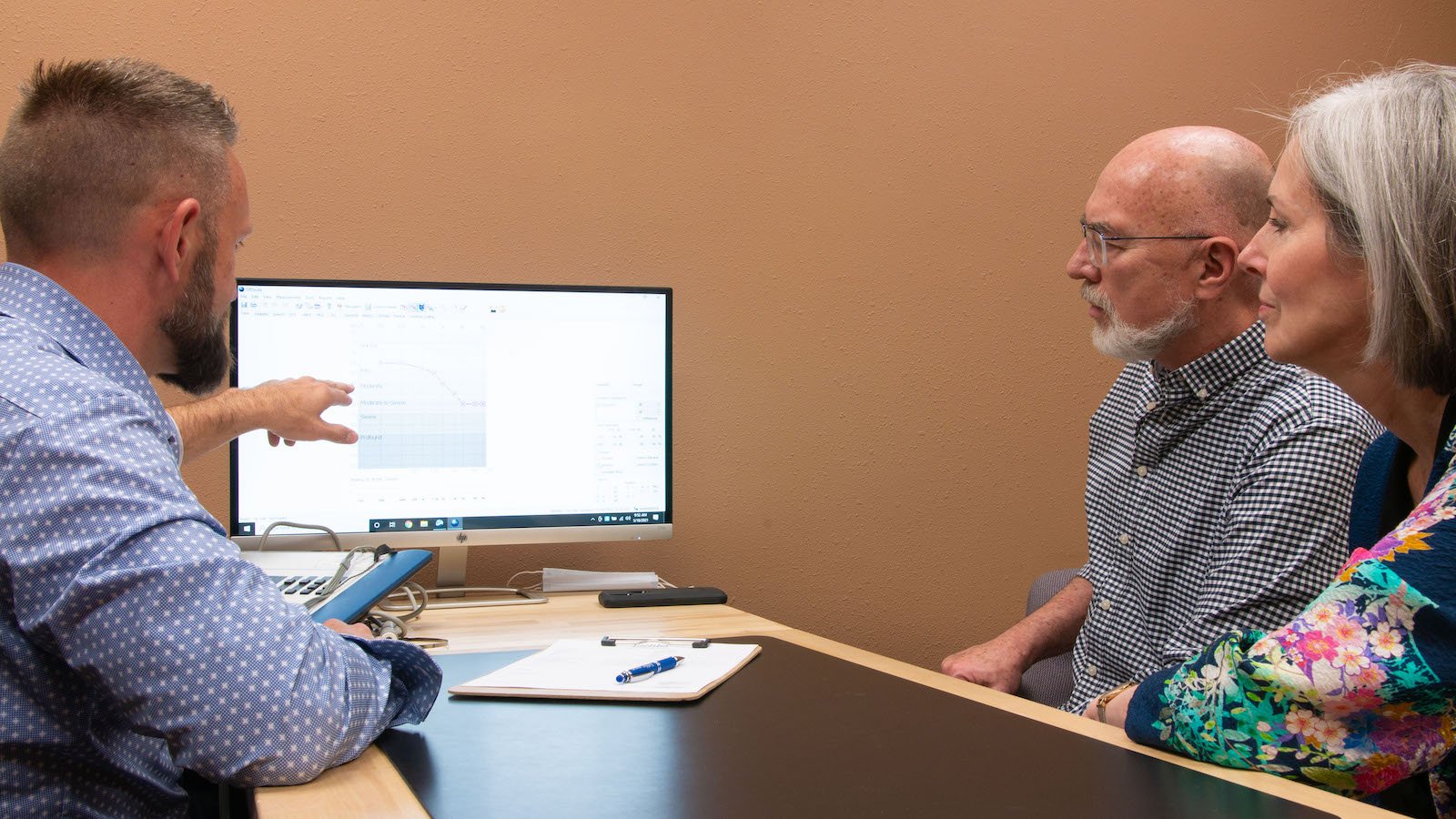
Common Questions (FAQ)
-
Maybe you're starting to notice that things don't sound as clear, maybe the TV is a little bit louder, it's harder to hear in background noise at a restaurant or at a family gathering or if there's a bunch of people around the table. The way to find out if you have hearing loss is to have your hearing tested, and at Eichler Hearing Center, we do hearing tests for free. You're gonna get a printed out report of your hearing test results. And we're going to walk through exactly what's going on with your hearing. Specifically Why do things sound the way that they do? Or maybe don't? Why are people's voices not clear? We will explain what's going on there and give you that that report.
-
The first thing to do there is to have your hearing tested at Eichler Hearing Center. If you have not done that, give us a call, we would be happy to help you with it. We'll give you a printed out report of your hearing test results and explain what's going on. And that's the time to really talk about your options such as if a hearing aid is appropriate, or maybe isn't appropriate, and if it can help or not.
-
The price of hearing aids completely depends on the type of hearing loss you have. In general, we have a number of different options available to try that could fit your needs and your budget: reconditioned hearing aids, interest and no-interest payment plans, and monthly manufacturer deals.
-
Payment plans are available.
There are both no interest options and low monthly payment options.
Payment options include:
Check (3%) discount
Credit Card
12 months 0% interest financing
Payment plan with low monthly payments (start at $75/month)
Combination of any of the above methods
-
We believe passionately that hearing aids do not make you weak. We think of it like Iron Man with his suit, Batman with his gadgets, or a soldier with his gun. Hearing aids are an addition, not a subtraction. And yet, the hearing aids we sell are nearly invisible. Check out Dr. Aaron Micko’s testimonial here to learn about how he was concerned about the look of hearing aids.
-
At Eichler Hearing Center, hearing tests are free.
-
Most insurance companies do not cover hearing aids.
Medicare does not cover hearing aids.
-
Generally speaking, you will need hearing aids in both ears if you have hearing loss in both ears. Hearing aids are designed to work together to give you appropriate directionality and sound coverage.
-
Eichler Hearing Center offers a 60 trial period, during which we will work with you to adjust and refine the sound to work best for you. It takes time to adjust to the new experience of wearing hearing aids, which is why we encourage you to wear them all the time the first week you have them even if it sounds and feels strange. At first it may seem difficult and distracting, but within a week or two, your brain will adjust. It also may take 2 or 3 adjustments by your hearing professional before you are completely comfortable with your hearing aids. Be as honest and specific as possible with the person adjusting your hearing aids. If at any time during that trial period you are not satisfied with the results, you may return the hearing aids for a full refund minus a $200 restocking fee.
-
Hearing aids normally last 5-7 years. The most important factor in determining longevity is cleaning and preventing wax buildup.
Wax is the biggest threat. This is a bigger problem for some people than for others, but anyone who wears hearing aids needs to be aware of it. Wax can literally block the ear canal (blocking sound also) and even push its way into the hearing aid and potentially damage it. To prevent this from happening you need to be carful about doing two things. First—change the wax guards often. How often depends on how big of a wax problem you have. For those with bigger wax problems that may mean every day or two, for others maybe every 2-3 weeks. The second thing is to clean them. Take a small alcohol prep pad available at any pharmacy, and clean the hearing aid every day when you take them off for the night.
-
A hearing aid battery will generally last 5-7 days with normal use. Always open the battery door when you take your hearing aids out to prevent the battery from losing power when it is not being used. The hearing aid will usually notify you if your battery is getting low by emitting a warning “beep”.
**Tip—the batteries are activated by exposure to the air, so try to wait 5-10 minutes after removing the sticky tab from the new battery before putting it in the hearing aid. This can increase battery life for up to a day.
-
Clean your hearing aids daily when you take them off for the night. Use an alcohol prep pad available at any pharmacy to wipe down all of the surfaces, being carful to remove any wax buildup that may have happened over the course of the day.
-
The most important consideration for choosing a hearing aid is to make sure the technology included will function properly in the activities and situations you encounter each week. Discuss your normal routine with your hearing professional and he/she can advise you of the features necessary to meet your needs in those situations.
The second consideration is choosing what style of hearing aid you want. Today, there are many styles to choose from--behind-the-ear (BTE), Receiver-in-the-ear (RITE), in-the-canal (ITC) and completely-in-the-canal (CIC). Some may prefer the style that rests deep in the ear canal and is virtually invisible. Others may prefer the traditional behind-the-ear styles that can be a little more comfortable.
-
Yes. Hearing loss is a progressive process that happens, for most, gradually over time as a result of exposure to noise or simple age. We may not even notice it at first, because we tend to adjust and compensate as it is happening--we turn the TV volume up a little higher or accuse others of mumbling making it difficult to understand them.
This process is called "auditory deprivation." When the tiny hair-like nerve cells in the inner ear begin to deteriorate and become less responsive to sound waves, they begin to atrophy, much like a muscle that is not used.
Recent medical studies, however, indicate that hearing aids do help slow the process of hearing loss. Hearing aids provide stimulation to these small hair-like nerve cells in the inner ear and get them working again much like exercise strengthens muscles. It is thought that this stimulation (exercise) can significantly slow the deterioration of the nerve cells and the process of hearing loss.
-
New technologies which have been developed in recent years are successfully helping people to hear voices clearly. These technologies enable hearing aids to detect and clarify speech and even better isolate what direction that speech is coming from.
Background noise used to be one of the primary complaints of hearing aid users. Today's hearing aids, however, can tell the difference between speech and noise, amplifying speech and minimizing the noise.
-
Functionality: Hearing aids need to be cared for and maintained properly to keep them working at an optimal level.
The most important thing in keeping your hearing aids working properly is cleaning them. They should be cleaned daily using an alcohol prep pad to wipe them down. If they are not cleaned daily, wax build-up can begin to block sound and damage the delicate technologies of the receiver and other components of the hearing aid.
A weak battery may also contribute to less than optimal performance. Make sure you keep fresh batteries on hand.
It is important to get your hearing aids checked by your hearing professional every 6-12 months to ensure the settings are appropriate to your needs and to compensate for any changes in your hearing. If you purchased your hearing aids at Eichler Hearing Center, there is no cost for a hearing aid check.
If your hearing aid should quit working completely, bring it to your hearing professional for evaluation.
Fit: Hearing aids should not be painful to wear. If your hearing aids cause you discomfort, your hearing professional can make adjustments to alleviate the problem. Your ears can change over time requiring changes to your hearing aid to help them fit properly. Do not hesitate to call for an appointment if your hearing aids are not comfortable to wear daily.
Sound: Hearing aids come with settings that can be adjusted to fit your individual needs and preferences. A simple adjustment may be all that it takes to alleviate this problem.
-
No. Hearing aids are designed with settings that can be adjusted as needed. You will most likely need several adjustments to the settings throughout the life of the hearing aids as your hearing changes.
-
We travel to a number of communities around Aberdeen. You can see a full list of each community we serve on our website under the “Locations” tab.
-
Yes! The way that the process works at Eichler Hearing Center is #1. Having a quick conversation on the phone to learn more about you and your hearing. #2. Is we bring you in, test your hearing, and walk you through a detailed explanation of exactly what’s going on with your hearing to answer why you’re hearing the way your’e hearing. There is no cost for the hearing test, it is completely free. Finally, #3. if your hearing loss merits wearing hearing aids, we’ll program a demo pair of hearing aids, throw them on you, and send you out the door to try them out. Just like the hearing test, this is also an absolutely free, no money down trial. If you like them after the trial, you can purchase a pair. If not, no sweat! If you don’t want them, we ain’t going to try and sell them to you because honestly, we think the hearing aids speak for themselves!
-
Yes! We are real. While we sell hearing aids at many outreach clinic locations, our main location where we sell hearing aids is in Aberdeen, SD. We passionately believe that hearing aids can help you; and because we are so confident in our product, we don’t charge for the hearing test or the trial. We believe the hearing aids speak for themselves.
We don’t want to waste your time either, so if you happen to not need hearing aids or the trial didn’t impress you, we aren’t going to try and sell you a pair. So, you don’t lose anything by coming in or/and doing the trial. In fact, you gain knowledge about your hearing and experience what life is like wearing hearing aids!
